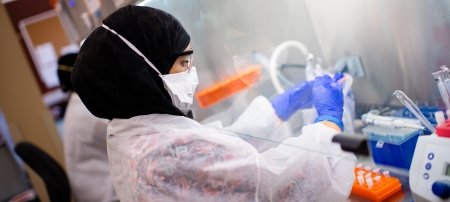Bias is a funny thing. You can’t see it until you acknowledge it. Biological sciences instructor Brigitte Morin challenges students to shine a light on the cognitive elephant in the room.
In this Michigan Tech Unscripted essay, Morin, an award-winning senior lecturer, shares her teaching approach — and lessons personally learned — about the science of bias and how the ingrained belief systems we all bring to the table historically and currently affect vaccination conversations.
About the Author
Two conversations regarding vaccination: One, with a close family member, ends with said relative making a trip all the way from North Carolina to the Upper Peninsula but leaving my address off her itinerary. Another, with a Wisconsin local, results in mutual agreement to switch topics and chat about local sites of interest instead.
My stance on vaccination is clear and unmoving — they work, they save lives, they’re safe. Getting your COVID-19 shot isn’t an option, it’s an obligation to help keep our immunocompromised community members safe and get us past this pandemic. My views stem from almost 10 years as an educator of all things immunology, a degree in medical laboratory science, and a thorough understanding of the scientific method’s twists and turns when tracking a pandemic.
Bias is always present but not always negative. A kind of mental shortcut that continuously influences the way we interact with the world, biases help us avoid information overload and make decisions more rapidly. But sometimes bias leads us down a path that’s unnecessary, fear-inducing and illogical. Say you take a trip to New York City and your wallet is stolen on the subway. From then on, your brain tells you New York and cities in general aren’t safe. Your experience led you to form a cognitive bias that might not be true. Your experience is certainly valid — getting pickpocketed is no fun! — but allowing that experience to dictate your outlook on urban travel diminishes your freedom. To layer the complexity of this human condition, say a friend travels to Chicago and loses their purse. All you can think is, “I told you so!” — bias confirmed thanks to anecdotal evidence.
This process of forming and solidifying biases happens every day. None of us are immune. Much of the time we’re unaware because most biases are subconscious. It takes an event or conversation to bring them to light. However, once confronted with information that contradicts our own interpretation of the world, it’s our responsibility to investigate — because new information and different perspectives are how we solve big challenges, like keeping us all healthy.
"Personal growth and universal well-being come from a willingness to learn, unlearn and relearn in order to do better over and over again."
The Scientific Method Helps Us Understand Vaccination Pushback
The arguments surrounding vaccinations, including COVID-19 and many others throughout history, present a fantastic opportunity to illuminate the role biases play in our beliefs and interactions with others. An entire week of my summer Current Health Issues course is dedicated to the anti-vaccination argument, the anti-science that fuels it and how to have a conversation surrounding the topic when you and your buddy are polar opposites.
We begin with immunology basics, including how vaccinations were developed, how they stimulate the immune system and how immunity changes over time. We investigate the many types of vaccinations, including how mRNA vaccines work. The background leads us to the real meat of the module, addressing up-front the biases that contribute to the anti-vaccination movement. Inspired by Hank Green’s popular and informative SciShow episode, “The Science of Anti-Vaccination,” students learn how to identify and define biases and understand how biases play a significant role in hesitancy to vaccinate.
The week culminates in a mock debate with students randomly situated on either side of the argument. When confronted with an anti-vaccination argument, pro-vaccination debaters are asked to identify their opponents' bias. For example, if an anti-vaccination proponent states, “Vaccines are just ways for pharmaceutical companies to make money,” the pro-vaccination proponent would (hopefully!) rebut the statement by saying, “Oh, interesting, it seems that your big-business bias is playing a role here.” The rebuttal continues with a scientifically supported counterstatement to solidify their statement. Then, students switch sides.
Down the Anti-Vax Rabbit Hole (Armed with a CRAAP Test)
In order to gather and understand various anti-vaccination arguments, students are asked to scour the internet for sites surrounding the topic. Earlier in the course, they learned how to evaluate credible sources by applying the CRAAP Test to evaluate how current, reliable and authoritative content is, asking what its purpose and point of view are. Inevitably, students come across blogs, Twitter posts and Facebook tirades that most often stem from unsupported anecdotes (“The vaccine gave my husband testicular cancer.”) or feature science-like statements linked to redacted studies (for example, the Wakefield Lancet study linking autism to the MMR vaccine, which has long since been disproven). Other content may purport a belief that vaccination isn’t natural and that contracting the disease in the real world is a safer way of being exposed (hello, naturalness bias!).
The anti-vaccination movement is old and deep. It doesn’t take much time on the internet to land yourself in a space where the voices against vaccination are loud, determined and looking for an audience whose biases they can feed. In these spaces, the real work begins — the work of staying open to listening without immediately shutting down while staying confident in the science informing us that vaccines are safe and save lives, and that now, more than ever, we each need to do our part.
Do our class debates make a difference? Change anyone’s mind? I can’t make direct attributions about our coursework’s outcome, but there is evidence that family and friends are, in general, strong influencers in convincing loved ones to get vaccinated. None of my students have reported making vaccine proponents out of opponents. But, they have told me that understanding bias psychology helps them have conversations where they listen without immediately reacting; engage in confident discourse supported by science and softened by compassion; and recognize that in order to grow as humans, we must be willing to acknowledge and unpack our biases. If nothing else, I hope it helps prevent them from knee-jerk Facebook-blocking their opposing-view-holding great aunt and burning familial bridges.
Eventually this pandemic will end. Families will sit around the dinner table to celebrate birthdays and weddings. And the arguments that come up, although still biased, will revolve around who picked on who more when they were growing up. I truly hope that relationships strained over vaccination status will heal — including my own.
Michigan Technological University is an R1 public research university founded in 1885 in Houghton, and is home to nearly 7,500 students from more than 60 countries around the world. Consistently ranked among the best universities in the country for return on investment, Michigan's flagship technological university offers more than 185 undergraduate and graduate degree programs in science and technology, engineering, computing, forestry, business, health professions, humanities, mathematics, social sciences, and the arts. The rural campus is situated just miles from Lake Superior in Michigan's Upper Peninsula, offering year-round opportunities for outdoor adventure.









Comments